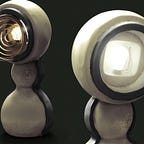Death, Erotica and a Surreal Noir.
In 2017, I saw death all around me. Rather than blocking it, my subconscious would seek it out, draw my attention and weave it into my thoughts. There was a drowned mouse outside the office, washed up from the drains onto the pavement; a large rat with its innards ruptured onto the playground outside my kids’ school; there were birds, lots of dead birds – tiny bald chicks fallen from nests, fat pigeons on path in peaceful sleeping poses, decaying carcasses on the sand where Seagull’s pulled from them their final strings of meat. Near our doctor’s surgery I saw a magpie pecking into the eye of dead squirrel. I took pictures of it all.
On the backdrop of the year's escalating political climate, a piece of absurdist theatre in itself, I committed myself to the creation of another reality – a surreal noir called Beckett. This wasn’t escapism, it was a head first decent into my own existential angst, an modern-day exploration of what it is to exist and the fragile nature of reality. The death I had been collecting became weaved into this work, and a nightmarish Dadaist collage of words, pictures and field music began to take shape.
“If you knew my mind you could never love me”. Words spoken by Amy to Beckett. Amy was Beckett’s reason to exist. Amy is gone now. She doesn’t exist.
I started to become fascinated with memories, and the interaction between the remembered past and the present. I read a book discussing how the memories we recall most are those which are most likely skewed into untruths – the life we wish we’d lived, a collection of manufactured thoughts and imagery. Yet these are the bedrocks on which our personalities exist. But then, what happens when we lose these memories. Which memories are most persistent and will be with us until we die.
The often unsaid reality is that the naked form, our sexual encounters and desires are very powerful and persistent memories and drivers. Rather than assuming that our remembrance would be all group laughter, first kisses, encounters and final moments, the naked human form would be persistent, though association and detail may fade.
Vintage erotica is captured as a memory. The early camera work and simple scenarios of undress are suggestive and framed in a single continuous point-of-view. There are an array of these videos to be found on archive.org and they proved an interesting touch point for the themes I was exploring in Beckett. Some material was downloaded and modified (using Photoshop auto-heal functions on facial features and distort the memory and suggest decay).
I need to explain something about Beckett. It is a story that is a collage of text, photography, film, field music, piano composition and…. gameplay. At this point at least 50% of readers will waver and stop. Yes, Beckett is a story told as a videogame. But, it is not a game. There are no puzzles or skill-based hurdles to trip you up. Simply, the format is liberating for this storyteller as it allows for a varied canvas of media and can place its audience into the narrative as opposed to having them exist outside of it. The potential here is huge. We just need to keep our prejudice and fears at bay.Beckett is abstract and suggestive. It relies on the audience imagination to make sense of its world and characters – who can be represented as anything from a slice of meat to an old brooch. The photographic component is overlaid on its canvas with a punk attitude, not caring for perfection but for impact. It is visceral and real, not digital and manufactured. It is the most beautiful and most ugly thing I’ve ever made. I’m incredibly proud.
Beyond death and erotica, there is the desire for meaning contrasted with the absurdity of life. There is also the theme of existence and reality – and what both terms mean to each other. The work draws on influence from William S Burroughs, Samuel Beckett, Jan Svankmajer and Roman Polanski. It is theatrical, artistic, literary and playful. It is very dark.
Experiment in form has always fascinated me. The cut-up techniques of Burroughs, the theatrical set ups of Beckett, the arthouse films of Lynch. Beckett, I hope, will be seen inline with these. It’s greatest strength and weakness is its form. It’s a work of interactive entertainment, which is a liberating formt, but unfortunately sits in a place of low cultural acceptance. Is this a memory waiting to happen, or a moment lost in time?
We are all memories waiting to happen. We are all memories waiting to fade.
You can find out more here: tsebeckett.blog
